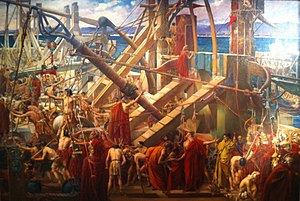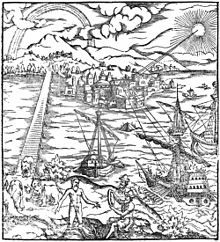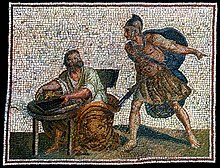Siege of Syracuse (213–212 BC)
| Siege of Syracuse | |||||||
|---|---|---|---|---|---|---|---|
| Part of Second Punic War | |||||||
 Archimedes Directing the Defenses of Syracuse by Thomas Ralph Spence (1895). | |||||||
| |||||||
| Belligerents | |||||||
|
|
Syracuse | ||||||
| Commanders and leaders | |||||||
|
Marcus Claudius Marcellus Appius Claudius Pulcher |
Archimedes † Epicydes Hippocrates | ||||||
| Strength | |||||||
| 16,000–18,000[1][2] | 21,000–25,000[2][1] | ||||||
| Casualties and losses | |||||||
| Heavy | 5,000+ (plus "large" amount of civilians)[3] | ||||||
The siege of Syracuse by the
Prelude

Sicily, which was wrested from
Despite diplomatic attempts, war broke out between the Roman Republic and the Kingdom of Syracuse in 214 BC, while the Romans were still busy battling with Carthage at the height of the Second Punic War (218–201 BC).
A Roman force led by the proconsul Marcus Claudius Marcellus supported by the propraetor Appius Claudius Pulcher consequently laid siege to the port city by sea and land in 213 BC. The city of Syracuse, located on the eastern coast of Sicily was renowned for its significant fortifications, great walls that protected the city from attack. Among the Syracuse defenders was the mathematician and scientist Archimedes.
Siege

The city was fiercely defended for many months against all the measures the Romans could bring to bear. Realising how difficult the siege would be, the Romans brought their own unique devices and inventions to aid their assault. These included the sambuca, a floating siege tower with grappling hooks, as well as ship-mounted scaling ladders that were lowered with pulleys onto the city walls.
Within the city, Archimedes devised defensive devices to counter the Roman efforts including a huge crane-operated hook – the
Stalemate

The siege bogged down to a
Conclusion
The successes of the Syracusans in repelling the Roman siege had made them overconfident. In 212 BC, the Romans received information that the city's inhabitants were to participate in the annual festival to their goddess Artemis. A small party of Roman soldiers approached the city under the cover of night and managed to scale the walls to get into the outer city and with reinforcements soon took control, but the main fortress remained firm.

Marcus Claudius Marcellus had ordered that Archimedes, the well-known mathematician – and possibly equally well-known to Marcellus as the
The Romans now controlled the outer city but the remainder of the population of Syracuse had quickly fallen back to the fortified inner citadel, offering continued resistance. The Romans now put siege to the citadel and were successful in cutting off supplies to this reduced area. After a lengthy eight-month siege which brought great hardship onto the defenders through hunger, and with parleys in progress, an Iberian captain named Moeriscus, one of the three prefects of Achradina, decided to save his own life by letting the Romans in near the Fountains of Arethusa. On the agreed signal, during a diversionary attack, he opened the gate. After setting guards on the houses of the pro-Roman faction, Marcellus gave Syracuse to plunder.[8] Frustrated and angered after the lengthy and costly siege, the Romans rampaged through the citadel and slaughtered many of the Syracusans where they stood and enslaved most of the rest. The city was then thoroughly looted and sacked.
Aftermath
The city of Syracuse was now under the control of Rome again, which united the whole of Sicily as a Roman province by 210 BC. The taking of Syracuse ensured that the Carthaginians could not get a foothold in Sicily, which could have led to them giving support to Hannibal's Italian campaign, and this allowed the Romans to concentrate on waging the war in Spain and Italy. The island was used as a vital gathering point for the final victorious campaign in Africa 10 years later and would prove to be an important step onto both Africa and Greece in coming Roman conflicts.
Syracuse was later extensively rebuilt and repopulated and would be an important city for the Roman empire until well into the 5th century, playing both a military and economic part in the creation of the empire.
In popular culture
- Archimedes and the siege of Syracuse are dramatically re-enacted in the classic early Italian silent film Cabiria (1914).
- The 1960 film Siege of Syracuse dramatizes the events of the siege.
- The events surrounding the siege are the basis for the manga Heureka by Hitoshi Iwaaki.
- The Siege of Syracuse is a campaign mission in the Rise of Rome expansion of Age of Empires, where players play as the Roman civilization to defeat the Carthaginians.
- The climax of the 2023 film Indiana Jones and the Dial of Destiny is set during the Siege of Syracuse. The setting also features the use of Classical Greek.
Citations
- ^ a b Brayan, Oliver (16 February 2020). "Siege of Syracuse II".[permanent dead link]
- ^ a b Adhikari, Saugat (10 February 2015). "Top 14 Decisive Ancient Battles in History".
- ^ "Siege of Syracuse | Summary". Encyclopedia Britannica.
- ^ Hoyos 2015, p. 159.
- ^ Plutarch, "Life of Marcellus", Lives
- ^ Livy xxi. 49–51, xxii. 37, xxiii. 21
- ^ "Archimedes – Biography, Facts and Pictures". famousscientists.org. Archived from the original on 21 September 2017. Retrieved 20 September 2017.
- ^ Norman Davies, Europe: A History, page 144
Bibliography
- Evans, R. J. (2009). Syracuse in Antiquity: History and Topography: Chapter 4: "The Four Great Sieges of Syracuse". University of South Africa Press.
- Govan, K. (2016) "Fortifications of Syracuse: Dionysius I, 405 to 396 BCE". University of Oregon Thesis. (Contains maps)
- Hoyos, Dexter (2015). Mastering the West: Rome and Carthage at War. Oxford: ISBN 978-0-19-986010-4.
- Rossi, A. (2000). "The Tears of Marcellus: History of a Literary Motif in Livy". Greece & Rome, Vol. 47, No. 1 (Apr., 2000), pp. 56-66.
External links
- Livius, Syracuse: History [1] Archived 3 March 2016 at the Wayback Machine
- Roman-empire.net, Capture of Syracuse [2]
- Plutarch's Life of Marcellus


